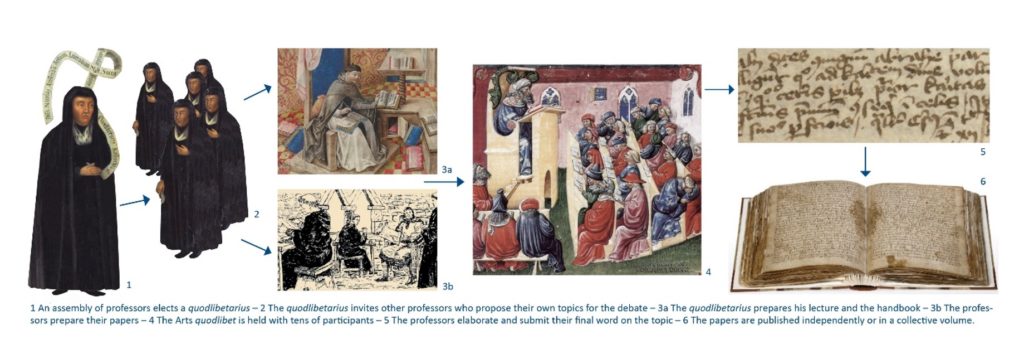ACADEMIA – Reconstructing Last Medieval Quests for Knowledge: Quodlibetal Debates as Precursors of Modern Academic Practice
ERC Starting Grant, grant agreement no. 949710
PI: M.A. Ota Pavlíček, Th.D., Ph.D.
Host Institution: Institute of Philosophy, Czech Academy of Sciences (IP CAS)
The ACADEMIA project is a pioneering study of the largely unresearched corpus of medieval manuscripts stemming from the neglected genre of quodlibetal debates that flourished at the Faculties of Arts of European universities from the 14th to the 17th century.
ACADEMIA addresses quodlibets as source material critical for the understanding of our scientific and scholarly past.
These collective debates, mostly underestimated by previous research as mere ceremonies or festivities, were among the intellectual practices shared by and connecting many European universities of the period. Participation in these events was usually prescribed by the Arts Faculty statutes for all masters of arts affiliated with the faculty, who periodically (usually annually) gathered in their dozens for the quodlibet to reply to questions assigned to them by a presiding master.

ACADEMIA hypothesises that the scholars gathered to present their most important scientific achievements and innovations over a given interval and that the whole process was similar to the modern practice of conference organisation and the publication of scientific results.
This unconventional perspective offers a novel theoretical framework for understanding medieval as well as modern academia. From this perspective among others, the Arts quodlibets were the most serious university-wide interdisciplinary research conferences, where leading scholars met to exchange and discuss knowledge.
Since they also included scholars who were already attached to the other faculties (i.e. of Law, Medicine and Theology), they covered all university subjects, including astronomy, ethics, law, logic, medicine, metaphysics, meteorology, optics, physics, theology, and others (“de quolibet” meaning “on anything”). In consequence, the written forms of these unique collective works of the Middle Ages mirror contemporary scientific thought and research culture to an extent that far exceeds the frontiers of our present understanding.
ACADEMIA’s ambition is to understand the roots of the modern practice of fostering collective science through a multi-faceted analysis of the Arts quodlibets based on new interpretative and digital methods. The quodlibets are a significant subject for research and study because they have not yet been appropriately understood and investigated as a coherent corpus, which ACADEMIA intends to establish as a new field of study.
The idea of a coherent corpus of texts, comparable across universities, will allow ACADEMIA to understand modalities of this scientific tradition in a European context, and to analyse phenomena relevant not only to the Middle Ages but to European intellectual history in general. These include the production, transmission and reception of knowledge, networking, calls for papers, conference organisation, the publication of research results, the production of collective volumes, and the spread of intellectual practices, as well as researchers’ social statuses and positions on the university job market.